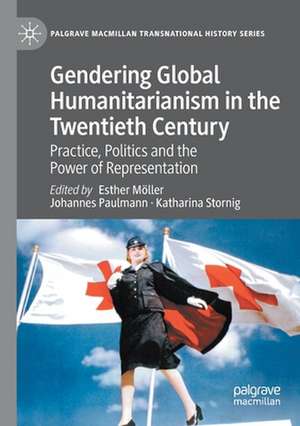Gendering Global Humanitarianism in the Twentieth Century: Practice, Politics and the Power of Representation: Palgrave Macmillan Transnational History Series
Editat de Esther Möller, Johannes Paulmann, Katharina Stornigen Limba Engleză Paperback – 25 aug 2021
“This volume is interesting both because of its global focus, and its chronology up to the present, it covers a good century of changes. It will help define the field of gender studies of humanitarianism, and its relevance for understanding the history of nation-building, and a political history that goes beyond nations.”
- Glenda Sluga, Professor of International History and ARC Kathleen Laureate Fellow at the University of Sydney, Australia
| Toate formatele și edițiile | Preț | Express |
|---|---|---|
| Paperback (1) | 890.06 lei 6-8 săpt. | |
| Springer International Publishing – 25 aug 2021 | 890.06 lei 6-8 săpt. | |
| Hardback (1) | 895.27 lei 6-8 săpt. | |
| Springer International Publishing – 25 aug 2020 | 895.27 lei 6-8 săpt. |
Din seria Palgrave Macmillan Transnational History Series
- 9%
 Preț: 694.40 lei
Preț: 694.40 lei -
 Preț: 383.93 lei
Preț: 383.93 lei -
 Preț: 374.59 lei
Preț: 374.59 lei -
 Preț: 394.51 lei
Preț: 394.51 lei -
 Preț: 384.86 lei
Preț: 384.86 lei -
 Preț: 383.93 lei
Preț: 383.93 lei -
 Preț: 387.38 lei
Preț: 387.38 lei - 15%
 Preț: 645.79 lei
Preț: 645.79 lei - 18%
 Preț: 733.33 lei
Preț: 733.33 lei - 18%
 Preț: 796.13 lei
Preț: 796.13 lei - 18%
 Preț: 727.48 lei
Preț: 727.48 lei -
 Preț: 418.07 lei
Preț: 418.07 lei - 15%
 Preț: 643.16 lei
Preț: 643.16 lei - 15%
 Preț: 636.12 lei
Preț: 636.12 lei -
 Preț: 389.88 lei
Preț: 389.88 lei -
 Preț: 385.84 lei
Preț: 385.84 lei -
 Preț: 385.84 lei
Preț: 385.84 lei -
 Preț: 391.02 lei
Preț: 391.02 lei - 18%
 Preț: 787.15 lei
Preț: 787.15 lei -
 Preț: 391.61 lei
Preț: 391.61 lei - 18%
 Preț: 832.26 lei
Preț: 832.26 lei -
 Preț: 387.75 lei
Preț: 387.75 lei - 18%
 Preț: 897.65 lei
Preț: 897.65 lei -
 Preț: 394.51 lei
Preț: 394.51 lei -
 Preț: 385.08 lei
Preț: 385.08 lei - 15%
 Preț: 703.85 lei
Preț: 703.85 lei - 18%
 Preț: 828.32 lei
Preț: 828.32 lei - 18%
 Preț: 773.87 lei
Preț: 773.87 lei -
 Preț: 392.60 lei
Preț: 392.60 lei -
 Preț: 389.70 lei
Preț: 389.70 lei - 15%
 Preț: 643.47 lei
Preț: 643.47 lei - 15%
 Preț: 701.40 lei
Preț: 701.40 lei -
 Preț: 387.20 lei
Preț: 387.20 lei
Preț: 890.06 lei
Preț vechi: 1085.44 lei
-18% Nou
Puncte Express: 1335
Preț estimativ în valută:
170.31€ • 185.58$ • 143.51£
170.31€ • 185.58$ • 143.51£
Carte tipărită la comandă
Livrare economică 24 aprilie-08 mai
Preluare comenzi: 021 569.72.76
Specificații
ISBN-13: 9783030446321
ISBN-10: 3030446328
Pagini: 331
Ilustrații: XIII, 331 p. 5 illus.
Dimensiuni: 148 x 210 mm
Greutate: 0.42 kg
Ediția:1st ed. 2020
Editura: Springer International Publishing
Colecția Palgrave Macmillan
Seria Palgrave Macmillan Transnational History Series
Locul publicării:Cham, Switzerland
ISBN-10: 3030446328
Pagini: 331
Ilustrații: XIII, 331 p. 5 illus.
Dimensiuni: 148 x 210 mm
Greutate: 0.42 kg
Ediția:1st ed. 2020
Editura: Springer International Publishing
Colecția Palgrave Macmillan
Seria Palgrave Macmillan Transnational History Series
Locul publicării:Cham, Switzerland
Cuprins
1. Gendering Twentieth-Century Humanitarianism: An Introduction.- Part I: Masculinities and Femininities in Humanitarian Practice and Discourse.- 2. Humanitarian Masculinity: Desire, Character and Heroics, 1876–2018.- 3. Protestant Missionaries, Armenian Refugees and Local Relief: Gendered Humanitarianism in Aleppo, 1920–1939.- 4. Maternalism and Feminism in Medical Aid: The American Women’s Hospitals in the United States and in Greece, 1917–1941.- Part II: Gender and the Politics of Humanitarianism.- 5. The Orphan Nation: Gendered Humanitarianism for Armenian Survivor Children in Istanbul, 1919–1922.- 6. The Politics of Gender and Community: Non-Governmental Relief in Late Colonial and Early Postcolonial India.- 7. Humanitarian Service in the Name of Social Development: The Historic Origins of Women’s Welfare Associations in Saudi Arabia.- Part III: The Power of Gendered Representations.- 8. Perilous Beginnings: Infant Mortality,Public Health and the State in Egypt.- 9. Parenthood as Aid: “Fathers”, “Mothers” and International Child Welfare from the late 1940s to the 1970s.- 10. In/Visible Girls: “Girl Soldiers”, Gender and Humanitarianism in African Conflicts, c. 1955–2005.- 11. Gender Histories of Humanitarianism: Concepts and Perspectives.
Notă biografică
Esther Moeller is Research Associate at the Liebniz Institute of European History in Mainz, Germany.
Johannes Paulmann is Director of the Leibniz Institute of European History at Mainz, Germany.
Katharina Stornig is Junior Professor of Cultural History at the University of Giessen, Germany.
Textul de pe ultima copertă
“This volume is interesting both because of its global focus, and its chronology up to the present, it covers a good century of changes. It will help define the field of gender studies of humanitarianism, and its relevance for understanding the history of nation-building, and a political history that goes beyond nations.”
- Glenda Sluga, Professor of International History and ARC Kathleen Laureate Fellow at the University of Sydney, Australia
Caracteristici
Discusses the relationship between gender and humanitarian discourses and practices in the twentieth century Analyses the ways in which constructions, norms and ideologies of gender both shaped and were shaped in global humanitarian contexts Combines state and non-state humanitarian initiatives and scrutinizes their gendered dimension on local, regional, national and global scales
